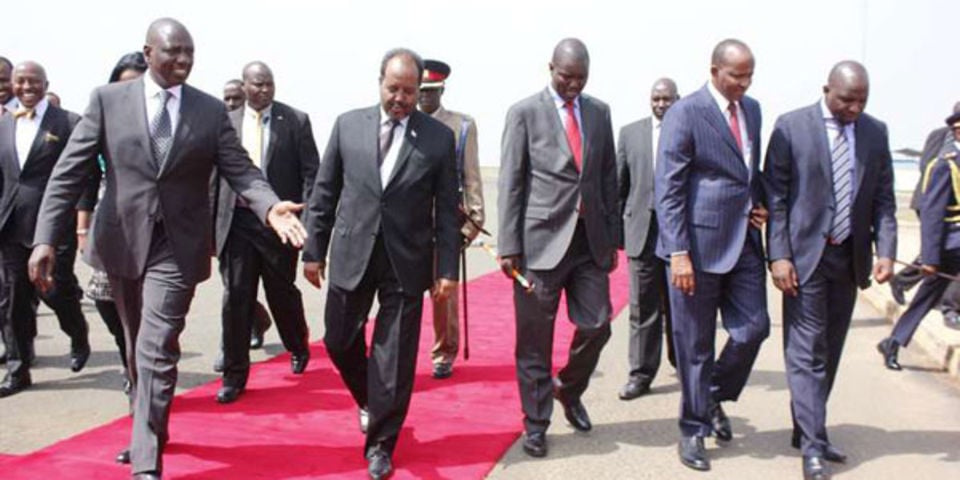
Jared Nyataya | Nation Media Group
By Gitau Warigi
Somalia is anticipating becoming the eighth member of the East African Community (EAC) this year.
An EAC verification team arrived in Mogadishu last week to assess Somalia’s readiness to join the organisation. Mogadishu’s envoy to the EAC, Abdusalam Omer Haldiye, says he expects the membership matter to be concluded before June.
Hey, not so fast, mister. Since 2012, Somalia has made several applications to join the EAC. They’ve been unsuccessful because the Horn of Africa country is considered problematic in its current form.
It’s unstable, with no functioning institutions and with the worst terrorist problem in the region — that of Al-Shabaab. In this view, Somalia is a basket case that will bring nothing to the EAC except agony.
The circumstances that 11 years ago caused Somalia’s EAC membership application to be deferred (‘rejected’ is the more accurate word) have not changed.
One, Somalia’s legal system is not compatible with the common law system which is in use in the major East African countries. Two, Somalia as of now has no constitution. It has a provisional one which is routinely disregarded when national and clan interests collide. Three, Somalia has no coherent market economy governed by regulations and rules.
In contrast, all members of the EAC have legal systems that are consistent with what East African courts apply. Somalia’s political and clan chiefs have not even agreed on the status of Mogadishu as the capital city. The reason is that the city and its surroundings are dominated by the Hawiye clan. Other clans resent this. How do you start admitting a country into your regional club when it has not reached a basic consensus on where its capital should be?
Though Somalia is geographically in East Africa, it does not have much in common with its EAC neighbours. It doesn’t meet the fundamental legal requirements of the EAC Treaty. Aside from lacking a constitution, its territorial integrity is fluid. That is fatal.
Over the years, the Somali state has splintered, amoeba-like, into ever smaller entities that profess autonomy and sometimes even independence -— Somaliland, Puntland and others, all clan-based. And in a continent where religion matters, Somalia’s EAC inclusion would make it the only wholly Muslim member. Within EAC countries, Muslims are in the minority.
But perhaps the most contentious issue from the point of view of Somalia’s immediate neighbours is its citizenship law. It dangles citizenship to all Cushitic people in the Horn of Africa such as the Oromo and Borana, and not just to Somali speakers.
Does this infer that the territories they occupy in neighbouring countries are also under Somalia’s oversight, maybe silent jurisdiction? The Somali Citizenship Law states: “For the purpose of this law, any person who by origin, language or tradition belongs to the Somali Nation shall be considered a Somali.”
Source of tension
The term ‘Somali Nation’ extends beyond Somalia proper to encompass Djibouti and Somali-inhabited regions of Kenya and Ethiopia. This citizenship law has long been a source of tension between Kenya and Ethiopia. The two countries have in the past opened hostilities with Somalia over her irredentism. It is highly unlikely Somalia will get the welcome mat into EAC until it is categorical that the territory and citizens it represents refer to the Republic of Somalia, not of the amorphous ‘Somali Nation’.
When in May last year Somalia elected President Hassan Sheikh Mohamud, he redoubled the push for Somalia’s EAC membership. He appointed Hadliye envoy to the EAC with a specific brief to lobby for that membership.
Mohamud, a Hawiye, had previously been president between 2012 and 2016 during when he attracted intense local and international criticism for corruption, nepotism and clannism. There are fresh accusations that he is deliberately hastening Somalia’s fragmentation into more clan fiefdoms. He has also alienated important constituencies within the larger Somali Nation.
Somalia’s clan-based power-sharing structures, which are considered sacrosanct, have been jolted by moves by President Mohamud that suggest he’s crowding into Prime Minister Hamza Abdi Barre’s powers. Also annoying to non-Hawiyes is the perception that Mohamud surrounds himself with Hawiye ultra-sectionalism.
And it seems the President hasn’t learnt from history. A disconcerting number in his cabinet are Somalis from Ethiopia, which has bred suspicion from that neighbour. The ‘Ethiopians’ include PM Barre, who comes from the same Shilabo region his late namesake and third president of Somalia, Siad Barre, was born.
Somalia’s embedded corruption seems to have been extended to its miraa trade with Kenya. A while back, President Mohamud imposed an unexplained US$ 7 per bag fee which does not fall under the normal tax regime. The fee is collected by agents based in Nairobi who must give permission before the khat is airlifted to Somalia. Somali miraa traders see the fee as extortion. It’s inconceivable these syndicates could be operating without the tacit knowledge of President Mohamud.
Even as Somalia seeks EAC membership, Kenya harbours resentment over their maritime feuds. EAC members have their border issues, of course, such as Kenya’s dispute with Uganda over Migingo. Ordinarily, though, such spats tend to be sorted out internally. However, Somalia has never hesitated to internationalise her quarrels. She was quick to take Kenya to the International Court of Justice over their Indian Ocean row.
Ultimately, the menace of terrorism will be the deal breaker for Somalia’s application if the country shows no roadmap to eradicating it. Al-Shabaab is a deadly regional threat. EAC supports the idea of open borders. Al-Shabaab can take advantage of it to wreak havoc across East Africa. That is a real fear.
Source: NATION


